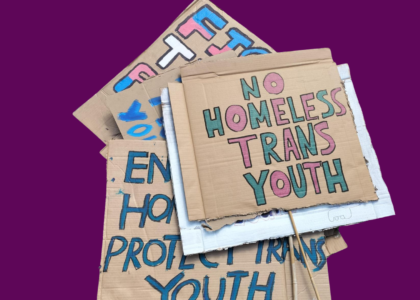Since 2023, St Martin-in-the-Fields Charity has supported MAC-UK through funding via our Mental Health Fund. For Mental Health Awareness Week 2025, we spoke to MAC-UK about the vital support they provide to young people experiencing mental-ill health. The theme for the week this year is community.
The Background
For years, insights from frontline workers and organisations in our Frontline Worker Survey have consistently shown there is inadequate access to mental health support for people experiencing homelessness. This missing support is vital to help people secure and keep a safe place to live.
In 2022, 75% of frontline staff described accessing mental health support for people they worked with as ‘difficult’ or ‘very difficult’. As a result, we set up a Mental Health Fund in 2023 to support three organisations that address highlighted gaps in provision.
The focus of the fund is to support organisations to provide targeted mental health support outside healthcare settings. It will assist people who are struggling with their mental health and addiction or the effects of trauma and are at critical transition points in their housing journey.
MAC-UK is a youth mental health charity based in London. We support the work they do through MAC- UK and Look Ahead’s Mental Health and Homelessness partnership, in London and Kent, a project that provides an integrated team of psychologists, practitioners, youth workers, and academics in two of Look Ahead’s intensive support accommodation services, catering for over 100 young people aged 16-25.
Before we get started
If you’d like to learn more about the various ways we help people at risk of or experiencing homelessness, then join our newsletter for the latest updates.
The relationship between mental health and homelessness
We are aiming to raise awareness and understanding of how mental health and homelessness are linked. Could you describe the importance of mental health support for your client group, and how this relates to their housing situation?
We’ve been a registered charity for 15 years, during this time we’ve learnt directly from young people about the ways in which the structures around them fail to keep them safe. We hear too often about how these structures harm not help, and the fact that housing is one of the things that has the greatest impact on young people and their mental health, and is a prime example of how a failing system is harming young people.
We have seen opportunities for access to housing dwindle over the course of the last 15 years, there “were 1.29 million households on local authority waiting lists at 31 March 2023, an increase of 6% compared to 31 March 2022 and the highest it has been since 2014.” (Gov.uk 2023) Alongside the wholesale cuts to youth provision over the course of austerity, it is vital that now more than ever a new approach to housing and support is needed.
The relationship between mental health and homelessness is deeply interconnected, with each often exacerbating the other. Mental health issues can not only lead to homelessness but also be worsened by structural factors like lack of support, poverty, and housing instability. (St Martins Charity)
We have worked with young people who, time and again, have entered into crisis after being placed in inappropriate, unsafe, insecure and temporary accommodation. The conditions in which people who are seeking housing are kept are often viewed to be worse than rough sleeping or trying to work it out for themselves.
Having had 15 years of personal experience of working in the housing sector, I have witnessed the deterioration in mental health of a considerable number of young people, and had to see them slide into the ever revolving door of homelessness, prison and being on the streets.
At MAC-UK we have worked with Youth Consultants to design a housing model that is not exploitative, is able to provide good quality accommodation, and provide young people with autonomy over their decision making, as well as find a way to try and support them into ownership of their housing environment. This has meant working with them to outline what they would need from housing support, that includes deep consideration of their mental health. The saddest thing about doing this project with them, is that it clearly outlined what has been missing in their, and so many others’, lives.
The social determinants of mental health are clear to see, having been researched and studied extensively, and until we are able to address the drivers of inequality in our society we will continue to see people’s mental wellbeing deteriorate. Housing, and within that housing conditions and housing security, is one of the fundamental factors when looking at the social determinants of mental health, so to provide people with adequate environments is a fundamental part of improving our society’s mental wellbeing.
The support: the importance of co-production
How do you support the young people you work with?
MAC-UK uses a contextual understanding of mental health in its work with young people and systems, locating well-being as being determined by the social context in which we exist. This means thinking about mental health being determined by access to resources, class, experiences of education, housing stability, family relationships, experiences of racism, sexism and other social determinants. From this foundational principle, we work alongside young people to co-design their own mental health interventions, that use community and youth work principles, that look very different to the traditional therapy room. Within the UK, co-production has been increasingly recommended as a method of engaging socially excluded groups, and called for in the implementation of statutory service provision (Norton, 2023; Sims-Schouten, 2022; Zlotowitz et al., 2016).
True co-production involves young people developing projects from the inception of an idea to the implementation of it. Co-production, when done properly, is not only about the outcome of designing services that better serve young people, but is about the process. Co-production has been recognised as a mental health intervention in and of itself. The meaningful involvement of service users in service design and delivery has been shown to foster empowerment, agency and self efficacy (Repper & Carter, 2011; Tew et al., 2004). When undertaken in a thoughtful and considered way, co-production can foster trusted relationships with professionals and colleagues, and provide a reduction in isolation (Slay & Stephens, 2013; Tew et al., 2004). Additional benefits for service users can include, increased confidence, greater trust in services, and enhanced professional skills and experience, all of which can contribute to improved mental health (Realpe & Wallis, 2010; Slay & Stephens, 2013).
What this has looked like in the project is spending time with young people consistently each week, getting to know them, their lives, interests, passions as well as the challenges they are going through. Trusted relationships are the foundation for any co-produced work and this takes time. Through getting to know people, we begin to find out people’s ideas and hopes for their lives as well as potential projects within the service. For example, through getting to know several women within a mother and baby service by holding weekly hour long catch ups and asking them what would support their wellbeing within the service, the women formed a playgroup. This is because people had experienced judgement
Support St Martin-in-the-Fields Charity and help transform lives.
How does community feature in the projects’ work in supporting people with their mental health journey?
“The theme for 2025’s Mental Health Awareness Week is ‘Community’, and we want to use Mental Health Awareness Week to celebrate the power and importance of community. Being part of a safe, positive community is vital for our mental health and wellbeing. We thrive when we have strong connections with other people and supportive communities that remind us, we are not alone. Communities can provide a sense of belonging, safety, support in hard times, and give us a sense of purpose.” How does community feature in the projects’ work in supporting people with their mental health journey?
Community is fundamental to the work we do at MAC-UK, and is a driving philosophy that we strive to embody in our practice. Unfortunately the conditions with which we are presented in the housing sector make it very difficult to foster meaningful community praxis. Too often the housing sector, or at least the homelessness pathways, are stuck in ways of working that are antithetical to community building.
For example, often homelessness services are unable to work innovatively, and are hamstrung by having to work primarily as landlords, and in turn the frontline workers have to become housing officers. This means that community work, or even support work more broadly, is secondary to ensuring the residents are set up with housing benefit, paying their service charge, and adhering to the tenancy agreement, and in turn the staff are then too busy with paperwork to have time to be able to do any meaningful community building.
Additionally, often the physical environment is not conducive to building community participation, as people are stacked closely together in small rooms, with little thought paid to how the space could foster community building.
What MAC-UK tries to do is build meaningful relationships with young people, firstly by spending time with them, not pressuring them to fill in any forms or support plans, but to truly get to know them and understand their context. We try to build on this with developing community links, reaching out to our networks and thinking about how we could bring people together based on their interests. This is fundamentally about listening to young people and trying to facilitate bringing their ideas to life.
Community is often messy, exciting, loud, and challenging. It means not being risk averse, and being able to be dynamic and responsive to the needs and wants of young people. It takes time to build relationships, and resources to make ideas happen. It also requires us to be able to bring people together. On this last point, when people are isolated in their rooms, in conditions that are not designed to bring people together, but simply to give them a bed, it is very difficult to build something meaningful.
It could be argued that the intention of austerity was to ensure that people were not able to meaningfully come together, and because of the slashing of resources in already marginalised communities, the potential for “positive outcomes” for these young people have dwindled. The subsequent impact of this is that the housing sector has had to work overtime simply to get people housed, rather than think of what quality of life actually looks like. When we talk to young people in the homelessness pathways, it is very common for them in the first few weeks of being housed to be incredibly positive and grateful, but after that to see their mental health deteriorate, and their engagement to drop off completely.




